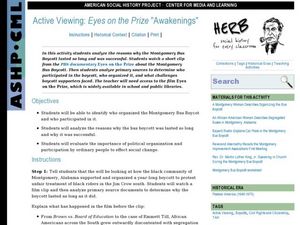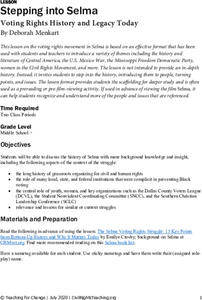Stanford University
Lesson Plan: Montgomery Bus Boycott
Most of us have heard of Rosa Parks, the Montgomery Bus Boycott, and Martin Luther King, Jr. But what about Claudette Colvin, Virginia Durr, Freedom Summer, or the Birmingham Children's Crusade? A five-lesson unit prompts class members...
Center for History Education
Helping to Move On? An Analysis of the Reconstruction Amendments
Reconstruction amendments: a helping hand or another form of slavery? An inquisitive lesson compares the Reconstruction legislation that ended slavery, granted citizenship, and protected voting right for African American men. Scholars...
Curated OER
Civil War Prison Camps
Fourth graders work with a partner to create a puppet show that demonstrates the condition of the prisoners in Andersonville, Georgia during the Civil War.
Civil War Trust
Civil War Soldier: Experiencing the Battle of Franklin
Fighting a war over home soil makes a living nightmare even more real. Class members describe the experience of a Civil War soldier during the Battle of Franklin, poised right at a major turning point of the war, after researching the...
Curated OER
Running for Freedom: The FUgitive Slave law and the Coming of the Civil War
In order to understand the complicated nature of slave laws during the Civil War, learners compare and contrast an abolitionist poster and a runaway slave ad. They use an attached worksheet to consider each primary source document, then...
Teaching Tolerance
The True History of Voting Rights
Explore what voting rights really are in an intriguing activity that explores the history of American voting. The resource examines the timeline of voting rights in the United States with group discussions, hands-on-activities, and...
Curated OER
The Many Faces of Paul Robeson
Students discuss and construct timelines based on the life of author/performer/Civil Right's activist, Paul Robeson. They view photographs of him at various times in his life and discuss the roles he may have been playing at those times.
Curated OER
Black Soldiers in the Civil War
Students explain how a history of slavery distinguishes American society from other societies. They study posters and documents from different eras in our history which document the practice of slavery, and civil rights violations.
Curated OER
America's Civil Rights Movement, Activity Five
Young scholars read and write poems for two voices about the Civil Rights Movement.
Curated OER
Marriage Equality: Different Strategies for Attaining Equal Rights
Students examine gays rights issues in the United States. In this gay marriage lesson, students investigate how people have made their cases before the executive, legislative, and judicial branches of government to secure their civil...
Curated OER
Active Viewing: Eyes on the Prize "Awakenings"
Dive deeper into the Montgomery Bus Boycott with this multi-stage lesson, centered on the essential question: Why did the boycott last so long? Historians investigate the Jim Crow south through a video clip (not included), then analyze...
Teaching for Change
Stepping into Selma
The 1964 Selma to Montgomery, Alabama voting rights marches are the focus of a lesson designed to introduce learners to people who took part in the Civil Rights Movement. Class members set into the role of one of the participants,...
Anti-Defamation League
Who Was César Chávez?
Scholars complete a KWL chart to indicate what they know about Cesar Chavez and then research what they want to know about this farm worker, labor leader, and civil rights activist. To complete the instructional activity, scholars...
Described and Captioned Media Program
Malcolm X: Make It Plain, Part II
Track the transformation of Malcolm Little into Malcolm X and then into El Jajj Malik El-Shabazz with the second part of Make it Plain, a documentary on the famous civil rights activist. Viewers consider not only how events shaped and...
PBS
The Meaning of the Fourteenth Amendment
The Fourteenth Amendment was extremely important to civil rights and is a crucial one to remember. The resource teaches about the Supreme Court decisions related to the amendment through writing exercises, reading, and working in small...
Learning for Justice
Mary Church Terrell
Excerpts from an 1898 speech by civil rights activist Mary Church Terrell offers young scholars an opportunity to investigate how Black American women fought for civil rights long before Rosa Parks and the civil rights movement of the...
University of North Carolina
Remembering Martin Luther King, Jr.
After reading the article "Kings Dream Everyday," class members conduct a Socratic seminar discussion of Martin Luther King's contributions to the civil rights movement. They then read and respond to a passage from Michael Eric Dyson's...
TCI
Ain't I a Woman?
Learners discover the impact of women on civil rights in United States history by analyzing primary source clues to identify influential female figures.
Mrs. Hodges' Social Studies Classes
I Have Rights?!
Do young people have rights in the United States? Your pupils will not only learn the answer to this important question, but will also build vocabulary through cloze activities and gain a thorough introduction to the Bill of Rights.
Literacy Design Collaborative
Exploring Character Development in The Watsons Go to Birmingham - 1963
How did the Civil Rights Movement affect young people in the United States? Scholars read Christopher Paul Curtis' novel, The Watsons go to Birmingham - 1963. Next, they write compare and contrast essays showing how the main characters...
Stanford University
Japanese American Incarceration
Using documents, such as reports from government sources and civil rights activists, budding historians explore the justification for forcing hundreds of thousands of Japanese-Americans to leave their lives and re-evaluate that tragic...
Learning for Justice
Mary McLeod Bethune
Young historians conduct a close reading of the text of an interview with Mary McLeod Bethune, the daughter of former slaves who taught herself to read, grew up to establish schools for other Black women, and went on to become an advisor...
Curated OER
Making a Case
Start the day by sharing opinions about human rights. Then, read "A Defiant Hussein Pleads Not Guilty to Mass Execution" with your middle and high school class. Your pupils research the specific charges in the case against Saddam...
Curated OER
The Language of the Civil Rights Movement:
Tenth graders study the poetry of the US Civil Rights movement and the Black Arts movement over a 12 day period. They author a website showing works of poetry that students have chosen to analyze and relate to these movements.

























